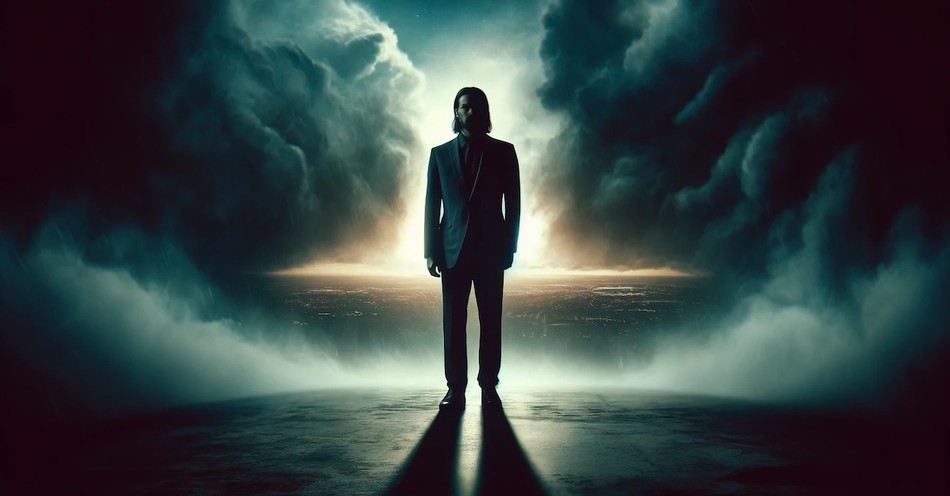“The Antichrist” and “The Man of Lawlessness” are two names for the same person who will be everything that is the very opposite of our Lord Jesus Christ, hence Antichrist.
Antichrist Meaning
It may come to a surprise that the word, “Antichrist,” is only found in the Bible in 1 and 2 John and occurs both in singular and plural forms.
In 2 Thessalonians 2, Paul refers to this person as the Man of Lawlessness. He puts himself in place of God’s law. That’s why he’s the Man of Lawlessness. And he’s a figure who the Bible repeatedly points to arising in the end times. There have been many, clearly, who are anti-Christ in one way or another, but here is the person who will be the distillation of opposition to our Lord and Savior Jesus Christ. He represents all that is hostile to God.
The Antichrist in the Bible
The Bible speaks about the Antichrist in the context of the last days, a time when evil will be fully unleashed on the earth. These days will be marked by a fierce and terrifying battle between God and His enemy, as described in 2 Thessalonians 2:3-4, which says, “Don’t let anyone deceive you in any way, for that day will not come until the rebellion occurs and the man of lawlessness is revealed, the man doomed to destruction.”
In 1 John 2:18, we are reminded that, “Dear children, this is the last hour; and as you have heard that the Antichrist is coming, even now many antichrists have come. This is how we know it is the last hour.” While the final Antichrist is a future figure, John also warns about a spirit of opposition to Christ that has been present throughout history, encouraging us to stay alert and grounded in our faith.
The good news is that Scripture consistently affirms God’s ultimate victory over evil. In Revelation 17:14, we read, “They will wage war against the Lamb, but the Lamb will triumph over them because he is Lord of lords and King of kings—and with him will be his called, chosen, and faithful followers.” And in Romans 16:20, Paul reassures believers, saying, “The God of peace will soon crush Satan under your feet.” These promises remind us that no matter how dark or overwhelming the battle may seem, God is in control, and His triumph is certain.
While it may be terrifying to think about a coming Antichrist but it's important to remember that for those of us who who trust in Christ, there is great hope and assurance. As Colossians 1:13 reminds us, “For He has rescued us from the dominion of darkness and brought us into the kingdom of the Son He loves.”
Can We Know Who the Antichrist is?
While we don't know who the Antichrist is or will be, Scripture provides a few explanations of his characteristics and actions. In 2 Thessalonians, Paul describes him in this way: “He will oppose and will exalt himself over everything that is called God or is worshiped, so that he sets himself up in God’s temple, proclaiming himself to be God.” (2 Thessalonians 2:4)
The Bible provides several descriptions and traits that define the profile of the Antichrist. Let's delve into these characteristics to understand what the Scriptures reveal about this figure:
1. The Antichrist opposes all religions and exalts himself over everything called god.
Paul doesn’t say simply that the Antichrist opposes God. He says the Antichrist takes his stand against every so-called god. What that means is he’s going to take his stand against all religion.
There’s increasingly a climate in our times in which many people of a secular mindset think that religion is the primary problem in the world.
“What causes all the trouble?,” they say, “What causes all the wars in the world? It’s religion.”
It’s not difficult to imagine in our time someone who will come up and say, with regards to Islam, Christianity, Hinduism, and Judaism, “A plague on all your houses. What we’ve got to get rid of is religion.”
He exalts himself against every so-called god and puts himself in the place of all other religion. It’s not difficult for me to imagine there being a massive following of a person who proclaims himself in this way and for people to say, “We’re desperate to throw off the shackles of our repressive religions.” He exalts himself above everything that’s called god.
2. The Antichrist puts himself in place of God’s law and God himself.
“He sets himself up in the temple of God” (2 Thessalonians 2:4). In the Old Testament, what’s the significance of the temple?
- If you go in to the most holy place of the temple, that’s where the 10 Commandments are – in the Ark of the Covenant. The Antichrist is putting himself in the place of God’s law.
- That’s also where the sacrifice was made; so he’s putting himself in the place of the sacrifice.
- That’s where the presence of God came down. The Antichrist is putting himself in the place of God."
This is the spirit of Antichrist: “I know the law; I’m above the law; I define what’s right and wrong, not God. I’m above the sacrifice. I’m putting myself in the place of God.”
3. The Antichrist is referred to as "the Beast"
In the Book of Revelation, the Antichrist is referred to as "the Beast" (Revelation 13). This beast emerges from the sea, symbolizing chaos and evil, and is given power by the dragon, representing Satan. The Beast's reign is marked by blasphemy against God, persecution of the saints, and a relentless quest for global domination.
4. The Antichrist will be a boastful king
The prophet Daniel provides a glimpse into the nature of the Antichrist, describing him as a boastful king (Daniel 7). This king speaks against the Most High, oppresses the holy people, and seeks to change set times and laws. Daniel's vision emphasizes the arrogance and audacity of the Antichrist, highlighting his efforts to undermine God's order and authority.
In Daniel 7:8, the Antichrist is portrayed as a "little horn" with a mouth that speaks boastfully. This imagery signifies his initial insignificance but eventual rise to power. Daniel 7:25 further elaborates on his actions, stating, "He will speak against the Most High and oppress his holy people and try to change the set times and the laws. The holy people will be delivered into his hands for a time, times and half a time."
5. The Antichrist will perform miracles
The Antichrist will be powerful and perform miracles. These miraculous acts are meant to authenticate his false claims and persuade many to follow him. A few of the miracles he will perform are described in Scripture:
Calling Fire from Heaven (Revelation 13:13): This act imitates the miracle performed by the prophet Elijah in the Old Testament (1 Kings 18:38). By replicating such a profound sign, the Antichrist seeks to present himself as a powerful prophet or divine figure.
Healing the Wounded Beast (Revelation 13:3, 12): The Beast receives a fatal wound but is miraculously healed, astounding the world and leading people to worship him. This counterfeit resurrection is designed to mimic Christ’s resurrection, aiming to deceive people into thinking the Antichrist possesses divine power.
Performing Other Miraculous Signs (2 Thessalonians 2:9): Paul’s reference to “all sorts of displays of power through signs and wonders” suggests a variety of miracles, not specified in detail but intended to awe and deceive the masses.
These miraculous acts serve a strategic purpose in the Antichrist’s plan to usurp God’s authority and establish his own rule.
6. The Antichrist will persecute Christians
The antichrist will fiercely persecute Christians, attempting to extinguish their faith and loyalty to God. This persecution will be marked by intense suffering, oppression, and a systematic effort to undermine and destroy the Christian faith.
Here are several key biblical references and examples that highlight this aspect of the Antichrist's reign:
Daniel 7:21, 25: In his vision, Daniel sees the Antichrist waging war against the saints and overpowering them. "As I watched, this horn was waging war against the holy people and defeating them" (Daniel 7:21). Additionally, Daniel 7:25 elaborates, "He will speak against the Most High and oppress his holy people and try to change the set times and the laws. The holy people will be delivered into his hands for a time, times and half a time." These verses indicate that the Antichrist will actively oppress and persecute those who remain faithful to God, seeking to change established religious practices and laws.
Revelation 13:7: The Apostle John’s vision in Revelation portrays the Beast, another term for the Antichrist, making war against the saints and prevailing over them. "It was given power to wage war against God's holy people and to conquer them. And it was given authority over every tribe, people, language and nation." This global authority and power will enable the Antichrist to systematically target and persecute Christians worldwide.
Matthew 24:9: Jesus warned His disciples about the persecution that would come in the end times. "Then you will be handed over to be persecuted and put to death, and you will be hated by all nations because of me." This warning indicates that the Antichrist’s reign will be a time of great tribulation for believers, marked by widespread hatred and violent persecution.
7. The Antichrist opposes all religions and exalts himself
Paul doesn’t say simply that the Antichrist opposes God. He says the Antichrist takes his stand against every so-called god. What that means is he’s going to take his stand against all religion.
There’s increasingly a climate in our times in which many people of a secular mindset think that religion is the primary problem in the world.
“What causes all the trouble?,” they say, “What causes all the wars in the world? It’s religion.”
It’s not difficult to imagine in our time someone who will come up and say, with regards to Islam, Christianity, Hinduism, and Judaism, “A plague on all your houses. What we’ve got to get rid of is religion.”
He exalts himself against every so-called god and puts himself in the place of all other religion. It’s not difficult for me to imagine there being a massive following of a person who proclaims himself in this way and for people to say, “We’re desperate to throw off the shackles of our repressive religions.” He exalts himself above everything that’s called god.
8. He will not work alone
The Antichrist will not act alone in his destruction. Revelation tells us of three figures that will act together. The unholy trinity in the Bible consists of three key figures: Satan (the opposite of God), the Antichrist (the opposite of Jesus the Son of God), and the false prophet (the opposite of the Holy Spirit)
Each plays a crucial role in the events described in Revelation, and together, they form a counterfeit version of the Holy Trinity. Revelation 19:20 tells us: “Then the beast was captured, and with him the false prophet who worked signs in his presence, by which he deceived those who received the mark of the beast and those who worshiped his image. These two were cast alive into the lake of fire burning with brimstone”.
9. The Antichrist will establish centralized worship and new religion
The Antichrist will implement a global religion centered around his own deification. This new system will likely involve mandatory participation, as suggested by the enforcement of the mark of the Beast (Revelation 13:16-17). Those who refuse to comply will face severe penalties, including economic sanctions and death.
Revelation 13 tells us about a central image of a beast that will be worshipped. The false prophet, who works alongside the Antichrist, will create an image of the Beast and compel people to worship it. "Because of the signs it was given power to perform on behalf of the first beast, it deceived the inhabitants of the earth. It ordered them to set up an image in honor of the beast who was wounded by the sword and yet lived. The second beast was given power to give breath to the image of the first beast, so that the image could speak and cause all who refused to worship the image to be killed." This image represents the focal point of the new religious system, requiring complete devotion and worship.
10. He will impact the global economy
The Antichrist will implement a system where everyone must receive a mark on their right hand or forehead to engage in commerce. "It also forced all people, great and small, rich and poor, free and slave, to receive a mark on their right hands or on their foreheads, so that they could not buy or sell unless they had the mark, which is the name of the beast or the number of its name." This mark, often referred to as the "mark of the Beast," will be a means of economic control, ensuring that only those who pledge allegiance to the Antichrist can participate in the marketplace. This system will control access to all economic transactions, from purchasing food to conducting business, making it impossible to survive without complying with the antichrist's demands.
Revelation 18 describes the fall of "Babylon the Great," a symbolic representation of the Antichrist's global economic system. This chapter outlines the opulence and wealth accumulated under this system, benefiting those aligned with the Antichrist. "The merchants of the earth will weep and mourn over her because no one buys their cargoes anymore" (Revelation 18:11).
Preparing for the Antichrist
When we piece together these biblical descriptions, a clear picture emerges of the Antichrist's actions and behaviors. He is a master of deception, using lies and false miracles to lead people astray. His blasphemy knows no bounds, as he openly defies God and demands worship for himself. This opposition to God is central to his identity, making him the ultimate adversary in the biblical narrative.
Understanding these characteristics helps us grasp why the Antichrist is such a significant and fearsome figure in Christian eschatology. His actions represent the pinnacle of human rebellion against God, embodying everything that is against Christ and His teachings.
John says in his letter that, even now, the spirit of Antichrist is at work. When we know what the Antichrist will look like – what the man of lawlessness will look like – that tells us what the spirit of this man is like when he finally comes.
- He puts himself above God’s law, thinking: “I’m the one who decides what’s right and wrong, not God.
- He puts himself above the sacrifice, thinking: “I’m a good person. I don’t need this.”
Putting oneself in the place of God goes all the way back to the garden on Eden. The spirit of Antichrist is already at work. And that’s the very center of the spiritual battle for us as we seek to be loyal to Christ and to serve him with all of our hearts today.
Sources: BibleStudyTools.com, Baker’s Evangelical Dictionary of Biblical Theology, Antichrist
Related Resource: Is the Antichrist Alive Today?
In this episode, Pastor Greg Laurie tackles one of the most provocative questions in Bible prophecy: Is the Antichrist alive today? Drawing from Scripture and current events observations, he explores how deception in the last days may not come in the form of obvious evil, but rather through things that appear good—even helpful. From fake tulips to fake lives on social media, Pastor Greg illustrates how our world is saturated with imitations and how this culture of counterfeit can prepare the way for the ultimate deceiver. He also unpacks the biblical profile of the Antichrist, not as a cartoonish villain, but as a charismatic, peace-promoting figure who will mislead many. If you enjoy this episode, be sure to follow The Greg Laurie Show on Apple or Spotify so you never miss an episode!
Photo Credit: Dalle AI




.jpg)